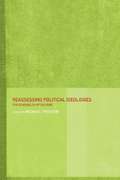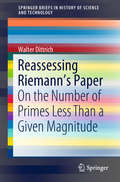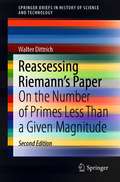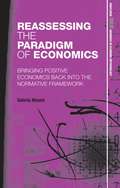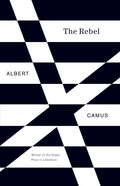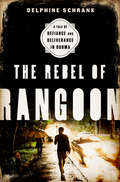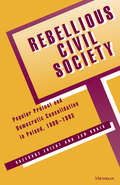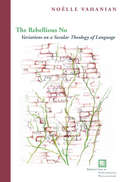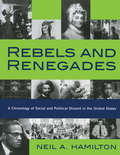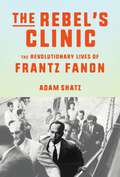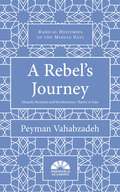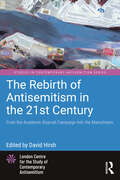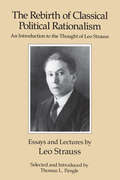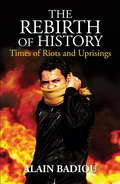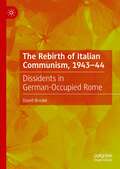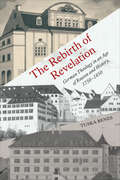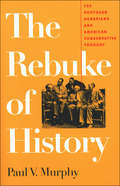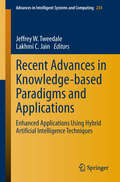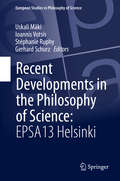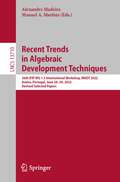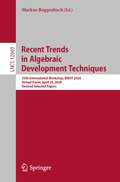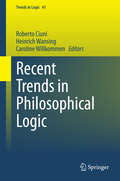- Table View
- List View
Reassessing Political Ideologies: The Durability of Dissent
by Michael FreedenThis book is a high-level examination of each of the major ideologies that have shaped political thinking, action and conflict. Each chapter provides a critical overview of the current state of the major ideologies and a retrospective assessment of the strengths, weaknesses, developments and transformations of these ideologies over the past century.The volume poses a strong challenge to those who have loudly proclaimed the "end of ideology", by demonstrating that it is impossible to understand current political developments without an appreciation of their ideological context. It features internationally respected contributors who are authorities in their fields, and will be an invaluable resource for both students and specialists in areas including Politics and International Relations.
Reassessing Riemann's Paper: On The Number Of Primes Less Than A Given Magnitude (Springerbriefs In History Of Science And Technology Ser.)
by Walter DittrichIn this book, the author pays tribute to Bernhard Riemann (1826–1866), mathematician with revolutionary ideas, whose work on the theory of integration, the Fourier transform, the hypergeometric differential equation, etc. contributed immensely to mathematical physics. This book concentrates in particular on Riemann’s only work on prime numbers, including such then new ideas as analytical continuation in the complex plane and the product formula for entire functions. A detailed analysis of the zeros of the Riemann zeta function is presented. The impact of Riemann’s ideas on regularizing infinite values in field theory is also emphasized.
Reassessing Riemann's Paper: On the Number of Primes Less Than a Given Magnitude (SpringerBriefs in History of Science and Technology)
by Walter DittrichIn this book, the author pays tribute to Bernhard Riemann (1826-1866), a mathematician with revolutionary ideas, whose work on the theory of integration, the Fourier transform, the hypergeometric differential equation, etc. contributed immensely to mathematical physics. The text concentrates in particular on Riemann’s only work on prime numbers, including ideas – new at the time – such as analytical continuation into the complex plane and the product formula for entire functions. A detailed analysis of the zeros of the Riemann zeta-function is presented. The impact of Riemann’s ideas on regularizing infinite values in field theory is also emphasized. This revised and enhanced new edition contains three new chapters, two on the application of Riemann’s zeta-function regularization to obtain the partition function of a Bose (Fermi) oscillator and one on the zeta-function regularization in quantum electrodynamics. Appendix A2 has been re-written to make the calculations more transparent. A summary of Euler-Riemann formulae completes the book.
Reassessing the Paradigm of Economics: Bringing Positive Economics Back into the Normative Framework (Routledge Inem Advances In Economic Methodology Ser. #12)
by Valeria MosiniWhen President Reagan and Prime Minister Thatcher adopted the neoliberal doctrine as the paradigm of economics, there was no evidence that the move would have been successful, but thirty years on, the recurrent crises that culminated in 2008 suggest a serious mis-match between expectations and outcomes: a re-examination of the paradigm is in order. This book focuses on Milton Friedman’s formulation of the neoliberal doctrine, and analyses two aspects that were essential to turning it into a fully-fledged paradigm: the attribution of scientific status to positive economics, which led to informing public policies on the requirements of the market; and the characterisation of economic freedom as capable of promoting political freedom, which led to identifying free market with democracy. The book exposes Friedman’s methodological argument for attributing positive economics scientific status as a failure, and his characterisation of economic freedom as a delusion; it identifies in the emergence as the mainstream in economics of the neoclassical synthesis, which borrowed from Walras’ the mathematical treatment of equilibrium but not the ethical and social framework in which it was inscribed, a development that facilitated the transition from the Keynesian to the neoliberal paradigm. Dr. Mosini shows that the gigantic bail-outs carried out courtesy of the public purse, which institutionalised the practice of collectivising losses while keeping profits private, were no accident, but the consequence of the rethinking of the function of lender of last resort according to Friedman’s conception of rationality in relation to risk, combined with his interpretation of the 1930s recession. The book concludes that the neoliberal paradigm has served the interests of the economically powerful social strata it was designed to benefit extremely well, but that the deep, and deepening, injustice it has brought about calls for a complete rethinking of the paradigm of economics according to ethical principles respectful of human values. This book should be of interest to students and researchers of Political Economy, Economic Methodology, History of Economic Thought and Philosophy.
The Rebel
by Albert CamusBy one of the most profoundly influential thinkers of our century, The Rebel is a classic essay on revolution. For Albert Camus, the urge to revolt is one of the "essential dimensions" of human nature, manifested in man's timeless Promethean struggle against the conditions of his existence, as well as the popular uprisings against established orders throughout history. And yet, with an eye toward the French Revolution and its regicides and deicides, he shows how inevitably the course of revolution leads to tyranny. As old regimes throughout the world collapse, The Rebel resonates as an ardent, eloquent, and supremely rational voice of conscience for our tumultuous times.Translated from the French by Anthony Bower.
Rebel Governance in Civil War
by Arjona, Ana and Kasfir, Nelson and Mampilly, Zachariah Ana Arjona Nelson Kasfir Zachariah MampillyThis is the first book to examine and compare how rebels govern civilians during civil wars in Latin America, Africa, Asia, and Europe. Drawing from a variety of disciplinary traditions, including political science, sociology, and anthropology, the book provides in-depth case studies of specific conflicts as well as comparative studies of multiple conflicts. Among other themes, the book examines why and how some rebels establish both structures and practices of rule, the role of ideology, cultural, and material factors affecting rebel governance strategies, the impact of governance on the rebel/civilian relationship, civilian responses to rebel rule, the comparison between modes of state and non-state governance to rebel attempts to establish political order, the political economy of rebel governance, and the decline and demise of rebel governance attempts.
The Rebel of Rangoon: A Tale of Defiance and Deliverance in Burma
by Delphine SchrankAn epic, multigenerational story of courage and sacrifice set in a tropical dictatorship on the verge of massive transformation, The Rebel of Rangoon captures a gripping moment of possibility in Burma. Journalist Delphine Schrank spent four years underground tracking Burmese dissidents whose semi-clandestine existence and fight for democracy remained largely hidden behind their globally celebrated figurehead, Aung San Suu Kyi. With intimate, vivid prose, Schrank follows the inner life of a daredevil young dissident, his friends and rivals, across rural hamlets and flickering internet connections, into prison cells and safe houses, and deep into their own hearts, as they escape spies and outwit interrogators, fall in love or slip into insanity. Through that dissident’s perspective, Schrank unfurls a harrowing account of a country’s efforts to emerge from military dictatorship, how a movement of dissidents came into being, how it almost died, and how it pushed its government to crack apart and begin an irreversible process of political reform. In doing so, Schrank delivers a profoundly human exploration of daring and defiance and of the power and meaning of freedom.
Rebel Rulers: Insurgent Governance and Civilian Life during War
by Zachariah Cherian MampillyRebel groups are often portrayed as predators, their leaders little more than warlords. In conflicts large and small, however, insurgents frequently take and hold territory, establishing sophisticated systems of governance that deliver extensive public services to civilians under their control. From police and courts, schools, hospitals, and taxation systems to more symbolic expressions such as official flags and anthems, some rebels are able to appropriate functions of the modern state, often to great effect in generating civilian compliance. Other insurgent organizations struggle to provide even the most basic services and suffer from the local unrest and international condemnation that result.Rebel Rulers is informed by Zachariah Cherian Mampilly's extensive fieldwork in rebel-controlled areas. Focusing on three insurgent organizations-the Liberation Tigers of Tamil Eelam (LTTE) in Sri Lanka, the Rally for Congolese Democracy (RCD) in Congo, and the Sudan People's Liberation Movement/Army (SPLM/A) in Sudan-Mampilly's comparative analysis shows that rebel leaders design governance systems in response to pressures from three main sources. They must take into consideration the needs of local civilians, who can challenge rebel rule in various ways. They must deal with internal factions that threaten their control. And they must respond to the transnational actors that operate in most contemporary conflict zones. The development of insurgent governments can benefit civilians even as they enable rebels to assert control over their newly attained and sometimes chaotic territories.
Rebellious Civil Society: Popular Protest and Democratic Consolidation in Poland, 1989-1993
by Grzegorz Ekiert Jan KubikPoland is the only country in which popular protest and mass opposition, epitomized by the Solidarity movement, played a significant role in bringing down the communist regime. This book, the first comprehensive study of the politics of protest in postcommunist Central Europe, shows that organized protests not only continued under the new regime but also had a powerful impact on Poland's democratic consolidation. Following the collapse of communism in 1989, the countries of Eastern Europe embarked on the gargantuan project of restructuring their social, political, economic, and cultural institutions. The social cost of these transformations was high, and citizens expressed their discontent in various ways. Protest actions became common events, particularly in Poland. In order to explain why protest in Poland was so intense and so particularized, Grzegorz Ekiert and Jan Kubik place the situation within a broad political, economic, and social context and test it against major theories of protest politics. They conclude that in transitional polities where conventional political institutions such as parties or interest groups are underdeveloped, organized collective protest becomes a legitimate and moderately effective strategy for conducting state-society dialogue. The authors offer an original and rich description of protest movements in Poland after the fall of communism as a basis for developing and testing their ideas. They highlight the organized and moderate character of the protests and argue that the protests were not intended to reverse the change of 1989 but to protest specific policies of the government. This book contributes to the literature on democratic consolidation, on the institutionalization of state-society relationship, and on protest and social movements. It will be of interest to political scientists, sociologists, historians, and policy advisors. Grzegorz Ekiert is Professor of Government, Harvard University. Jan Kubik is Associate Professor of Political Science, Rutgers University.
The Rebellious No: Variations on a Secular Theology of Language (Perspectives in Continental Philosophy)
by Noëlle VahanianThis book aims to renew theological thinking by extending and radicalizing an iconoclastic and existentialist mode of thought. It proposes a theology whose point of departure assumes and accepts the critiques of religion launched by Nietzsche, Freud, Marx, and Feuerbach but nevertheless takes theological desire seriously as a rebellious force working within, but against, an anthropomorphic, phallogocentric worldview. As a theology of language, it does not claim any privileged access to some transcendent divine essence or ground of Being. On the contrary, for Noelle Vahanian theology is a strictly secular discourse, like any other discourse, but aware of its limitations and wary of great promises—its own included. Its faith is that this secular theological desire can be a force against the constitutive indifference of thought, and it is a meditative act of rebellion. Aphoristic instead of argumentative, this book offers an original and constructive engagement with such seminal issues as indifference, belief, madness, and love.
Rebels and Renegades: A Chronology of Social and Political Dissent in the United States
by Neil A. HamiltonRebels and Renegades examines 350 years of history through the eyes of the uncompromising. Presented in nine clearly written chronological chapters, this comprehensive reference covers the major events and personalities in the history of extremism in the U.S. Besides chronicling the event itself, entries, ranging from 500 to 1000 words, include background information and historic effects. In addition to the chronology, sidebars highlight historical, biographical, cultural, and ethical aspects of the story, tying the past to the present. Topics include the influence of radical idea on the mainstream, the role of violence in radicalism, and the evolving relationship between radicals and the media. An extensive appendix of excerpts, transcripts, and full source documents round out the work. To see the Introduction, a list of detailed contents, a generous selection of sample pages, and more, visit the Rebels and Renegades website.
The Rebel's Clinic: The Revolutionary Lives of Frantz Fanon
by Adam ShatzOne of The New Yorker's best books of 2024Named a most anticipated book of 2024 by Foreign Policy | Lit Hub | The Millions"Nimble and engrossing. . . [An] exemplary work of public intellectualism." —Becca Rothfeld, The Washington PostA revelatory biography of the writer-activist who inspired today’s movements for social and racial justiceIn the era of Black Lives Matter, Frantz Fanon’s shadow looms larger than ever. He was the intellectual activist of the postcolonial era, and his writings about race, revolution, and the psychology of power continue to shape radical movements across the world. In this searching biography, Adam Shatz tells the story of Fanon’s stunning journey, which has all the twists of a Cold War-era thriller. Fanon left his modest home in Martinique to fight in the French Army during World War II; when the war was over, he fell under the influence of Existentialism while studying medicine in Lyon and trying to make sense of his experiences as a Black man in a white city. Fanon went on to practice a novel psychiatry of “dis-alienation” in rural France and Algeria, and then join the Algerian independence struggle, where he became a spokesman, diplomat, and clandestine strategist. He died in 1961, while under the care of the CIA in a Maryland hospital. Today, Fanon’s Black Skin, White Masks and The Wretched of the Earth have become canonical texts of the Black and global radical imagination, comparable to James Baldwin’s essays in their influence. And yet they are little understood. In The Rebel’s Clinic, Shatz offers a dramatic reconstruction of Fanon’s extraordinary life—and a guide to the books that underlie today’s most vital efforts to challenge white supremacy and racial capitalism.Includes 8 pages of black-and-white photographs
A Rebel's Journey: Mostafa Sho'aiyan and Revolutionary Theory in Iran (Radical Histories of the Middle East)
by Peyman VahabzadehFollowing the 1953 coup that toppled the democratically elected government of Mossadeq and restored the rule of the Shah in Iran, Mostafa Sho&‘aiyan became a key figure on the country&’s militant left. From a life underground he contributed significantly to the study of Iranian history and politics, and developed a unique theory of revolution. A Rebel&’s Journey provides fascinating insights into the life and work of this singular theoretician. Peyman Vahabzadeh sets Sho&‘aiyan&’s thought in the context of his time and place, and explores how his revolutionary theory might contribute to today&’s expanding movements for social justice and liberation.
The Rebirth of Antisemitism in the 21st Century: From the Academic Boycott Campaign into the Mainstream (Studies in Contemporary Antisemitism)
by David HirshThe Rebirth of Antisemitism in the 21st Century is about the rise of antizionism and antisemitism in the first two decades of the 21st century, with a focus on the UK. It is written by the activist-intellectuals, both Jewish and not, who led the opposition to the campaign for an academic boycott of Israel. Their experiences convinced them that the boycott movement, and the antizionism upon which it was based, was fuelled by, and in turn fuelled, antisemitism. The book shows how the level of hostility towards Israel exceeded the hostility which is levelled against other states. And it shows how the quality of that hostility tended to resonate with antisemitic tropes, images and emotions. Antizionism positioned Israel as symbolic of everything that good people oppose, it made Palestinians into an abstract symbol of the oppressed, and it positioned most Jews as saboteurs of social ‘progress’. The book shows how antisemitism broke into mainstream politics and how it contaminated the Labour Party as it made a bid for Downing Street. This book will be of interest to scholars and students researching antizionism, antisemitism and the Labour Party in the UK.
The Rebirth of Classical Political Rationalism: An Introduction to the Thought of Leo Strauss
by Leo Strauss Thomas L. PangleThis concise and accessible introduction to Strauss's thought provides, for wider audience, a bridge to his more complex theoretical work. Editor Pangle has gathered five of Strauss's previously unpublished lectures and five hard-to-find published writings and has arranged them so as to demonstrate the systematic progression of the major themes that underlay Strauss's mature work.
The Rebirth of History
by Alain Badiou Gregory ElliottIn the uprisings of the Arab world, Alain Badiou discerns echoes of the European revolutions of 1848. In both cases, the object was to overthrow despotic regimes maintained by the great powers--regimes designed to impose the will of financial oligarchies. Both events occurred after what was commonly thought to be the end of a revolutionary epoch: in 1815, the final defeat of Napoleon; and in 1989, the fall of the Soviet Union. But the revolutions of 1848 proclaimed for a century and a half the return of revolutionary thought and action. Likewise, the uprisings underway today herald a worldwide resurgence in the liberating force of the masses--despite the attempts of the 'international community' to neutralize its power.Badiou's book salutes this reawakening of history, weaving examples from the Arab Spring and elsewhere into a global analysis of the return of emancipatory universalism.
The Rebirth of Italian Communism, 1943–44: Dissidents in German-Occupied Rome
by David BroderDuring the final years of the Second World War, a decisive change took place in the Italian left, as the Italian Communist Party (PCI) rose from clandestinity and recast itself as a mass, patriotic force committed to building a new democracy. This book explains how this new party came into being. Using Rome as its focus, it explains that the rebirth of the PCI required that it subdue other, dissident strands of communist thinking. During the nine-month German occupation of Rome in 1943-44, dissident communists would create the capital’s largest single resistance formation, the Communist Movement of Italy (MCd’I), which galvanised a social revolt in the capital's borgate slums. Exploring this wartime battle to define the rebirth of Italian communism, the author examines the ways in which a militant minority of communists rooted their activity in the everyday lives of the population under occupation. In particular, this study focuses on the role of draft resistance and the revolt against labour conscription in driving recruitment to partisan bands, and how communist militants sought to mould these recruits through an active effort of political education. Studying the political writing of these dissidents, their autodidact Marxism and the social conditions in which it emerged, this book also sheds light on an often-ignored underground culture in the years that preceded the armed resistance that began in September 1943. Revealing an almost unknown history of dissident communism in Italy, outside of more recognisable traditions like Trotskyism or Bordigism, this book provides an innovative perspective on Italian history. It will be of interest to those researching the broad topics of political and social history, but more specifically, resistance in the Second World War and the post-war European left.
The Rebirth of Revelation: German Theology in an Age of Reason and History, 1750–1850 (German and European Studies)
by Tuska BenesDespite being a pillar of belief in the Judeo-Christian tradition, the idea of revelation was deeply discredited over the course of the Enlightenment. The post-Enlightenment restoration of revelation among German religious thinkers is a fascinating yet underappreciated moment in modern efforts to navigate between reason and faith. The Rebirth of Revelation compares Protestant, Catholic, and Jewish reflections on revelation from 1750 to 1850 and asserts that a strategic transformation in the term’s meaning secured its relevance for the modern age. Tuska Benes argues that "propositional" revelation, understood as the infallible dispensation of doctrine, gave way to revelation as a subjective process of inner transformation or the historical disclosure of divine being in the world. By comparatively approaching the unconventional ways in which Protestantism, Catholicism, and Judaism have rehabilitated the concept of revelation, The Rebirth of Revelation restores theology to a central place in modern European intellectual history.
The Rebuke of History
by Paul V. MurphyIn 1930, a group of southern intellectuals led by John Crowe Ransom, Allen Tate, Donald Davidson, and Robert Penn Warren published I'll Take My Stand: The South and the Agrarian Tradition. A stark attack on industrial capitalism and a defiant celebration of southern culture, the book has raised the hackles of critics and provoked passionate defenses from southern loyalists ever since. As Paul Murphy shows, its effects on the evolution of American conservatism have been enduring as well. Tracing the Agrarian tradition from its origins in the 1920s through the present day, Murphy shows how what began as a radical conservative movement eventually became, alternately, a critique of twentieth-century American liberalism, a defense of the Western tradition and Christian humanism, and a form of southern traditionalism--which could include a defense of racial segregation. Although Agrarianism failed as a practical reform movement, its intellectual influence was wide-ranging, Murphy says. This influence expanded as Ransom, Tate, and Warren gained reputations as leaders of the New Criticism. More notably, such "neo-Agrarians" as Richard M. Weaver and M. E. Bradford transformed Agrarianism into a form of social and moral traditionalism that has had a significant impact on the emerging conservative movement since World War II.
Recent Advances in Knowledge-based Paradigms and Applications
by Jeffrey W. Tweedale Lakhmi C. JainThis book presents carefully selected contributions devoted to the modern perspective of AI research and innovation. This collection covers several areas of applications and motivates new research directions. The theme across all chapters combines several domains of AI research, Computational Intelligence and Machine Intelligence including an introduction to the recent research and models. Each of the subsequent chapters reveals leading edge research and innovative solution that employ AI techniques with an applied perspective. The problems include classification of spatial images, early smoke detection in outdoor space from video images, emergent segmentation from image analysis, intensity modification in images, multi-agent modeling and analysis of stress. They all are novel pieces of work and demonstrate how AI research contributes to solutions for difficult real world problems that benefit the research community, industry and society.
Recent Developments in the Philosophy of Science: EPSA13 Helsinki
by Uskali Mäki Ioannis Votsis Stéphanie Ruphy Gerhard SchurzThis volume showcases the best of recent research in the philosophy of science. A compilation of papers presented at the EPSA 13, it explores a broad distribution of topics such as causation, truthlikeness, scientific representation, gender-specific medicine, laws of nature, science funding and the wisdom of crowds. Papers are organised into headings which form the structure of the book. Readers will find that it covers several major fields within the philosophy of science, from general philosophy of science to the more specific philosophy of physics, philosophy of chemistry, philosophy of the life sciences, philosophy of psychology, and philosophy of the social sciences and humanities, amongst others. This volume provides an excellent overview of the state of the art in the philosophy of science, as practiced in different European countries and beyond. It will appeal to researchers with an interest in the philosophical underpinnings of their own discipline, and to philosophers who wish to explore the latest work on the themes explored.
Recent Trends in Algebraic Development Techniques: 26th IFIP WG 1.3 International Workshop, WADT 2022, Aveiro, Portugal, June 28–30, 2022, Revised Selected Papers (Lecture Notes in Computer Science #13710)
by Alexandre Madeira Manuel A. MartinsThis book constitutes the thoroughly refereed post-conference proceedings of the 26th International Workshop on Algebraic Development Techniques, WADT 2022, held in Aveiro, Portugal, in June 2022.The 6 revised papers presented together with 2 invited papers were carefully reviewed and selected from 25 submissions. The contributed presentations covered a range of topics about the algebraic approach to system specification, which encompasses many aspects of the formal design of software systems. Originally born as formal method for reasoning about abstract data types, the algebraic approach now covers new specification frameworks and programming paradigms (such as object-oriented, aspect-oriented, agent-oriented, logic, and higher-order functional programming) as well as a wide range of application areas (including information systems, concurrent, distributed, and mobile systems).
Recent Trends in Algebraic Development Techniques: 25th International Workshop, WADT 2020, Virtual Event, April 29, 2020, Revised Selected Papers (Lecture Notes in Computer Science #12669)
by Markus RoggenbachThis book constitutes the thoroughly refereed post-conference proceedings of the 25th International Workshop on Algebraic Development Techniques, WADT 2020, held virtually in April 2020.The 7 revised papers presented together with an invited paper were carefully reviewed and selected from 9 submissions. The contributed presentations covered a range of topics about the algebraic approach to system specification, which encompasses many aspects of the formal design of software systems. Originally born as formal method for reasoning about abstract data types, the algebraic approach now covers new specification frameworks and programming paradigms (such as object-oriented, aspect-oriented, agent-oriented, logic, and higher-order functional programming) as well as a wide range of application areas (including information systems, concurrent, distributed, and mobile systems).
Recent Trends in Philosophical Logic
by Roberto Ciuni Heinrich Wansing Caroline WillkommenThis volume presents recent advances in philosophical logic with chapters focusing on non-classical logics, including paraconsistent logics, substructural logics, modal logics of agency and other modal logics. The authors cover themes such as the knowability paradox, tableaux and sequent calculi, natural deduction, definite descriptions, identity, truth, dialetheism and possible worlds semantics. The developments presented here focus on challenging problems in the specification of fundamental philosophical notions, as well as presenting new techniques and tools, thereby contributing to the development of the field. Each chapter contains a bibliography, to assist the reader in making connections in the specific areas covered. Thus this work provides both a starting point for further investigations into philosophical logic and an update on advances, techniques and applications in a dynamic field. The chapters originate from papers presented during the Trends in Logic XI conference at the Ruhr University Bochum, June 2012.
The Reception of Aristotle's Ethics
by Jon MillerAristotle's ethics are the most important in the history of Western philosophy, but little has been said about the reception of his ethics by his many successors. The present volume offers thirteen newly commissioned essays covering figures and periods from the ancient world, starting with the impact of the ethics on Hellenistic philosophy, taking in medieval, Jewish and Islamic reception and extending as far as Kant and the twentieth century. Each essay focuses on a single philosopher, school of philosophers, or philosophical era. The accounts examine and compare Aristotle's views and those of his heirs and also offer a reception history of the ethics, dealing with matters such as the availability and circulation of Aristotle's texts during the periods in question. The resulting volume will be a valuable source of information and arguments for anyone working in the history of ethics.
